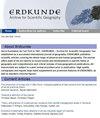圣保罗的安全生产:从社会实践理论的角度看日常行为模式的变化
IF 1.1
4区 社会学
Q3 GEOGRAPHY
引用次数: 0
摘要
在城市犯罪和不安全的背景下,对公共安全政策的研究越来越多,这在很大程度上反映了一种向新的控制文化转变的范式。与此同时,研究很少将关于不安全感出现的描述性研究与旨在提高城市安全的话语、政策和措施联系起来。本文试图通过探索日常生活中安全实践和安排的相互交织来解决这种比较。根据社会实践理论以及不同规模的机构和结构——机构、政策和话语——的相互作用,我们认为公共和私人安全政策与城市中产阶级居民与空间相关的日常实践之间存在着相互关系。以圣保罗市的两个区为例,本文介绍了对居民进行的70次定性访谈的结果,这些访谈涉及在不同(内部)安全生产过程中日常实践中的行为和言论之间的关系。我们讨论了这些安全做法是如何成为地方一级转变公共安全和邻里关系的基础概念的。因此,本文的主要目的是通过将社会实践理论实证应用于实践,从理论上克服公共安全和私人安全中阅读社会性的概念二元论。本文章由计算机程序翻译,如有差异,请以英文原文为准。
The production of (in)security in São Paulo: changing patterns of daily actions from the perspective of social practices theory
The growing research on public security policy in the context of urban crime and insecurity largely re-flects a shifting paradigm towards a new culture of control. At the same time, research has rarely asso-ciated descriptive studies about the emergence of insecurities with discourses, policies and measures that aim at the production of greater urban security. This paper seeks to address this comparison through exploring the interwovenness of security practices and arrangements in everyday life. Drawing on the theory of social practices and the interaction of agencies and structures – institutions, policies and discourses at different scales – we argue that there is a mutual interrelation between public and private security policies on the one hand and the space-related everyday practices of urban middle-class residents on the other hand. Taking two districts located in the city of São Paulo as examples, the paper presents the results of 70 qualitative interviews with inhabitants concerning the nexus of doings and sayings in everyday practices in the context of different (in-)security production processes. We discuss how these security practices emerge as the grounding concept of shifting public security and neighbourhood at the local level. Thus, the main purpose of the paper is to theoretically overcome the conceptual dualism of reading sociality in public and private (in-)security by putting social practices theory empirically into practice.
求助全文
通过发布文献求助,成功后即可免费获取论文全文。
去求助
来源期刊

Erdkunde
地学-自然地理
CiteScore
2.00
自引率
7.10%
发文量
17
审稿时长
>12 weeks
期刊介绍:
Since foundation by Carl Troll in 1947, ''ERDKUNDE – Archive for Scientific Geography'' has established as a successful international journal of geography. ERDKUNDE publishes scientific articles covering the whole range of physical and human geography. The journal offers state of the art reports on recent trends and developments in specific fields of geography and comprehensive and critical reviews of new geographical publications. All manuscripts are subject to a peer-review procedure prior to publication. High quality cartography and regular large sized supplements are prominent features of ERDKUNDE, as well as standard coloured figures.
 求助内容:
求助内容: 应助结果提醒方式:
应助结果提醒方式:


